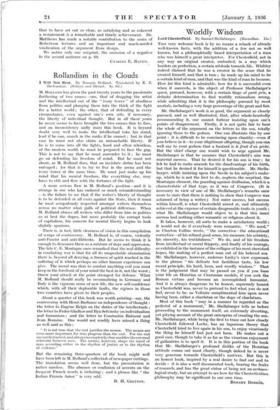Rollandism in the Clouds I Will Not Rest. By Remain
Rolland. Translated by K. S. Shelvankar. (Selwyn and Blount. 88. 6d.) M. HOLLAND has given the past twenty years to the passionate furthering of two causes—one, that of dragging the artist and the intellectual out of the "ivory tower" of aloofness from politics and plunging them into the thick of the fight
for a better world ; the other, that of defending in every circumstance, even against one's own side, if necessary, the liberty of individual thought. But in all these' years he never seems to have brought the two causes face to face, and an inconsistency sadly mars this book. It is beyond doubt very well to make the intellectual take his stand, lead if he can, march in the ranks if he cannot ; but in that case he must not also claim an untouchable liberty. If he is to come into all the fights, hard and often relentless, of the modern world, he must be prepared to face the gag. This is not to say that he must surrender to it ; he must go on defending his freedom of mind. But he must not shout, as M. Rolland does, that an inviolate shrine has been outraged ; for that is to try to live in the arena and the ivory tower at the same time. He must just make up his mind that his mental freedom, like everything else, may have to ebb and flow with the fortunes of the fight.
A more serious flaw in M. Rolland's position—and it is strange in one who has endured so much misunderstanding —is the failure to sec that if the writer's liberty of thought is to be defended at all costs against the State, then it must be most scrupulously respected amongst writers themselves across no matter what gulfs of political difference. When M. Rolland abuses all writers who differ from him in politics as at best the dupes, but more probably the corrupt tools of capitalism, his concern for mental liberty begins to look slightly spurious.
There is, in fact, little clearness of vision in this compilation of scraps of controversy. M. Rolland is, of course, violently anti-Fascist and anti-Hitlerite. But he seems to think it is enough to denounce them as a mixture of dope and oppression.! The late C. E. Montague once remarked that the real difficulty in combating war is that for all its unspeakable abomination, there is, beyond all denying, a fineness of spirit reached in the. suffering of it which perhaps no other human experience can give. The moral was that to combat anything evil you must keep in the forefront of your mind the best in it, not the worst ; throw your attack at the point strongest for defence. What
M. Rolland should really be reconnoitring in Germany and Italy is the vigorous sense of new life, the new self-confidence which, with all their deplorable faults, the regimes in those two countries have given to their peoples.
About a quarter of this book was worth printing—say, the controversy with Henri Barbusse on independence of thought : the letter to Eugene Relgis on the duties of the intellectuals ; the letter to Fedor Gladkor and Ilya Selvinsky on individualism and humanism ; and the letter to Constantin Balmont and Ivan Bounine. One would not readily have missed a thing so well said as this :
"It is not true that the end justifies the means. The means are even more important for true progress than the end. For the end (so rarely reached, and always incompletely) but modifies the external relations between men. The means, however, shape the mind of- man according either to the rhythm of justice or to the rhythm of violence."
But the remaining three-quarters of the book might well have been left in M. Holland's collectioh of newspaper cuttings. The translation seems well done, but the presentation is rather careless. The absence or confusion of accents on the frequent French words is irritating ; and a phrase like "the Indian Francis Asissi " is very odd.
R. H. GanTrox.










































 Previous page
Previous page